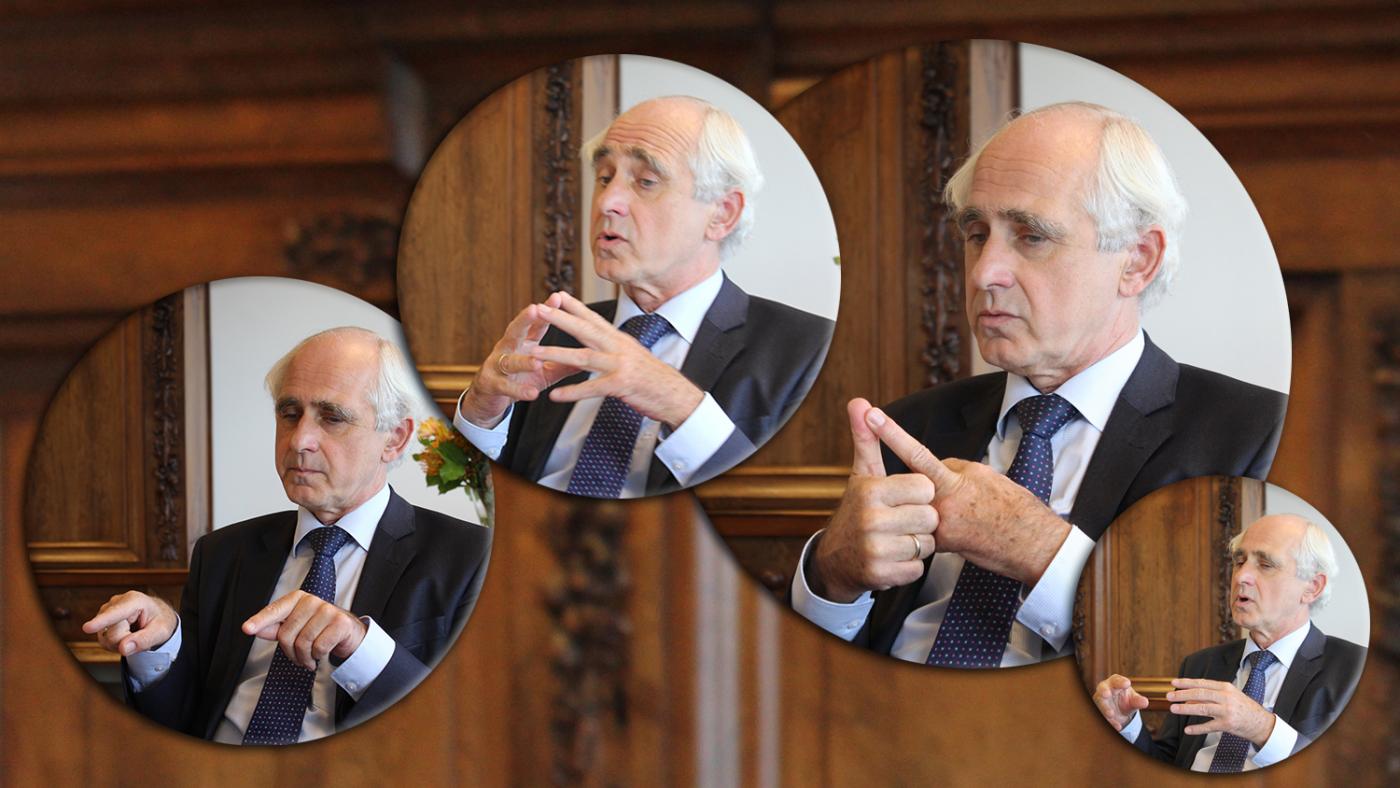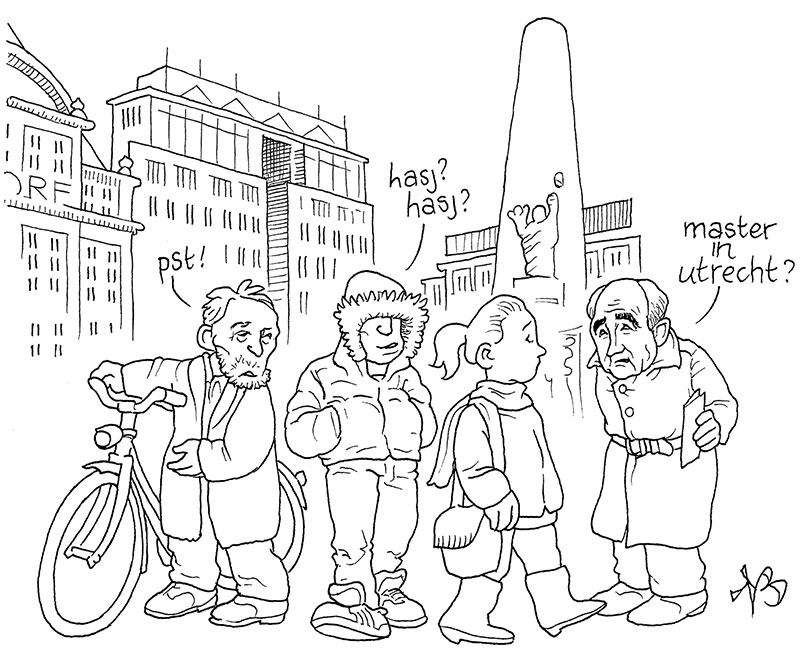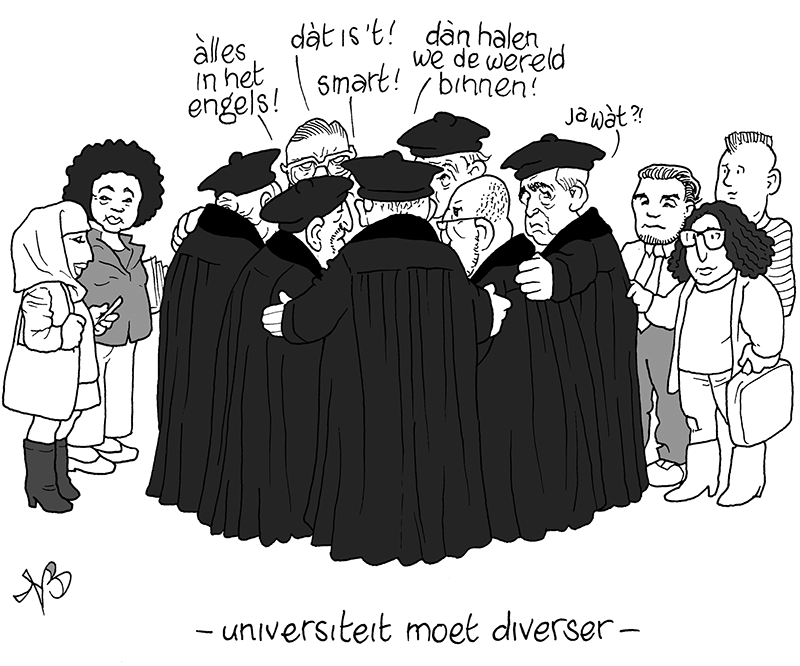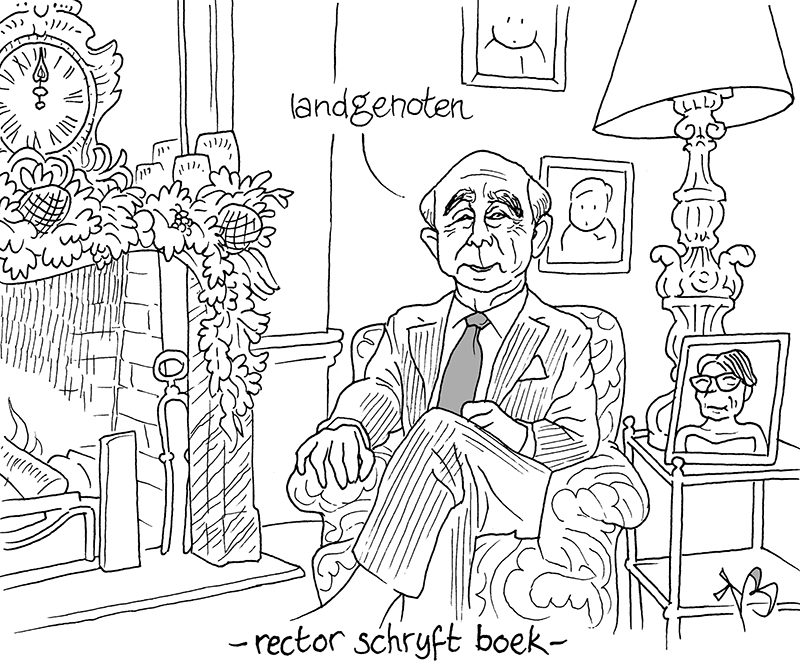Bert van der Zwaan looks back on nine quotes from eight years of rectorship

Bert van der Zwaan provided the university with a spirited rector who rarely if ever minced words and always faced discussions head on. DUB looked back and talked to the rector about several issues he dealt with in the past years.
'Keep the paradoxical student on point'
During his first Anniversary Address in 201, Van der Zwaan spoke about the paradoxical student: the student that’s happy to be enrolled at the UU, but once in, presents himself as insecure and unmotivated. The cause is the enormous influx of students, and mostly of those who don’t belong at a university at all. His proposed approach was to keep those students on point by making them work hard.
“I still see those paradoxical students every now and then,” Van der Zwaan says. “They’re the passive ones, with little to no initiatives of their own. The problem started when too many students came to the university. You want the students who are super curious to come here. I do think that the matching process helps to make students rethink whether they really belong at a university or not. I’m not talking about all students. Luckily, I also see students that are extremely involved in their studies and outside of them, in things like sustainability for example.”
'The UU is in danger of becoming a bachelor’s university'
A few years ago, many students left Utrecht after graduating from their bachelor’s, to do a master’s program elsewhere. There was a negative balance in the influx of master’s students. This was the immediate reason for the masters renewal. “You saw that five, six years ago, students were positive about the bachelor’s programs, but the appreciation of the master’s studies fell behind. By looking at ways to better connect the programs to the job market, and improving the content of the research masters, we really managed to improve this.”
Utrecht was one of the first to abolish the so-called ‘flow-through master’s’, which later became default policy everywhere. There was a hard cut, and no guarantee for automatic enrollment in a UU master’s program. “You can select your students now. Although the selection process isn’t the same everywhere, it can happen that people are excluded. International students compete with Dutch students. In politics, you often hear calls to reinstate the flow-through process we had, mostly to benefit Dutch students. But you can’t have one set of criteria for one group, and a different set for others. I’m in favor of the selection process. You want to have the best students.”

'Go against the current, and choose slow science'
Van der Zwaan received a lot of comments on his call for slow science during a speech at the New Year’s reception in 2013. He called for less quantity, more quality. That would cost us our rankings, critics thought.
“That isn’t true at all. I’ve tried to aim at more quality since the day I started. I’d rather have one amazing story in a high-quality magazine, than ten stories published in lesser magazines. That’s appreciated by rankings, too. And take the ‘Supervisor of the year’, for instance. That’s horrible. We should aim at getting the best dissertations, not the most.”
In this, he was ahead of later manifestos by Science in Transition and The New University, groups that both pointed out ‘perverse stimuli’ and the need to aim more at relevance to society. “I agreed with Frank Miedema and his Science in Transition on that point. But I vehemently disagree with the notion that all Humanities research should be eliminated. It was said it didn’t have enough impact on society. That’s utter nonsense.”
'Research has the task of solving society’s problems'
“About seven years ago, we were already saying that all our research should be excellent. Fine, but that’s not enough. I worked to ensure that our research is valuable in solving society’s problems. We’re doing well in this in the disciplines of sustainability and life sciences. But I think it’s rather inexcusable that we as a university aren’t doing any large-scale research into migration, for instance.”
Several fundamental choices have been made in research. Four strategic themes were chosen, in which multidisciplinary research is the norm. “Aside from that I’m proud that we started the so-called hubs this year. In those, we’re really establishing the contact between civil organizations and researchers. They’re meeting places for people with ideas, or companies with money that want to brainstorm. And it works. Look at the research on energy and how you can achieve less emission, or the Institutions hub that looks at civil initiatives.”
'Diversity at the university is a necessity'
The debate on diversity is often simplified to terms of English versus Dutch, Van der Zwaan stated two years ago. “I’ve always said that diversity at a university is of utmost importance. You need to look at it in a broad sense, both in male-to-female ratios and intercultural proportions. A diverse organization functions better, as practice proves.”
In practice, it turns out to be quite difficult to achieve that diversity. “As a rector I’ve experienced that a new professor would be recommended, and it would it would be the umptieth clone of the existing professor. It can be quite tricky to convince a dean that there are other equally qualified candidates, too. And that has to change. I don’t think you should talk about it in terms of quotas, but it can work in some cases.”

University has to become more divers. Professors gather and talk about the advantages
'The footprint at the UU has to - and can - become smaller'
Sustainability is important to Van der Zwaan. He’s discussed with students and employees about collaborating with Shell, about leaving the UU’s bank ABN Amro, and gave a speech on banning meat from UU cafeterias.
“Technically, as a rector, I’m not in charge of operations. Still, I met more and more students and employees who felt it was important to work or study at a sustainable organization. You want to teach your students to become socially responsible people. So what’s the university’s own responsibility? I myself don’t eat meat, also because of the impact. In that context, I would approve of it if the university were to set an example. We’ve already agreed at the Administration Building not to use meat anymore. But of course I can’t force others to take on my view. It’s a debate that has to be held repeatedly.”
'No more hazing at student associations'
In December, news broke that TV show Rambam had filmed undercover during UVSV’s introduction period. “The video gives a nasty image of the introduction period,” the rector wrote at the time. UVSV has since conducted an investigation into the incidents, and the ties to the UU are largely repaired.
“Essentially, I think that students should be able to experience a safe and nice start to their studies, in which their personal integrity is never threatened. I feel the introduction period could be held differently. If you’re working on an assignment together, that will also creates social cohesion. You don’t need hazing to achieve that.”
The rector can have his say, but formally speaking, it’s not up to the university. The only thing the university can do is to make the subsidies they give to the associations subject to conditions. “We’re connected to each other. We’re close partners. That’s why we have a protocol in which we write down our agreements. Associations should stick to those agreements. If they don’t, we take measures, as we’ve done with UVSV. You do have to grant the association the opportunity to defend itself. In this case, the media attention was overwhelming, and I defended the association in a blog at that point in time. Eventually, it turned out the incidents weren’t as bad as they were claimed to be.”
Not just the UVSV made the news, the UU’s Geosciences Association - Van der Zwaan’s own department - did too. “We didn’t sing those songs in my day,” he promises. “But it’s not as if that kind of thing was wholly unknown, either. I think the biggest problem with the student world is the drinking culture. Students are drinking more, and I myself have had parents complain about it to me. I’d love if this issue was given more attention in the future.”
'The receipts commotion gave the wrong image'
“The commotion that hit me hardest, was the fuss about the receipts,” Van der Zwaan says. It was claimed he had wrongly flown business class, and booked an overly expensive hotel. “In my time as rector I’ve always aspired to be an example of integrity, an example for the teachers. I’ve voluntarily given up salary, and declared expenses soberly. The inspection talked about flights and hotels which I didn’t even book myself, and which were approved by the Supervisory Board. And then the inspection and the media paint a picture of us as greedy. That hurts.”
'Will the university still exist in 2040?'
(Rector writes a book: "My fellow countrymen")
During a sabbatical leave, Van der Zwaan travelled around the world. Based on his experiences, he wrote a book called Will the university make it to 2040? The book was translated to English, and garnered quite a lot of response.
“If I’m still alive in 2040, I won’t be able to recognize the university anymore. The make-up of courses will be different. There’ll be robotization, and digitalization of education. But I’m optimistic. The university will still exist in 2040.”
The book, along with his chairmanship of the international cooperation of research universities Leru, ensured that many doors opened for Van der Zwaan in the past years. “In these years, I tried to stand outside, looking in. What does the university look like from a distance? In what kind of bubble are we? That strengthened my conviction that we need to get in touch with society, create the civic university. Make sure the university listens to society, and translate that into education and research. That’s an important task for the future.”
In the coming week, DUB will publish stories based on ideas by guest editor-in-chief Bert van der Zwaan.